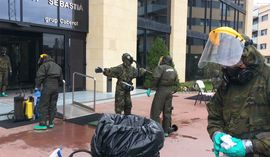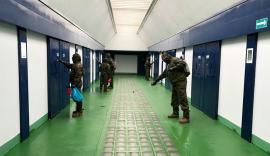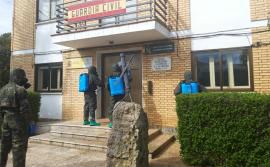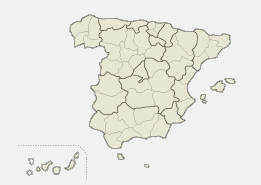- Home
- Latest News
- Todos para todo y por todos
Everyone helping in every way
Monday, April 13, 2020
Number: 7928
Operation 'Balmis'
The units from the Army, regardless of their specialism, are cooperating during the health emergency.

Disinfection in the elderly care home in Alcarrás

Disinfection in the prison in Huelva

Disinfection in the Guardia Civil station in Mayorga
The units from the Army, regardless of their specialism, are cooperating during the health emergency.
It doesn’t matter if you normally handle missiles, vehicles, breaching operations, or infiltrations on foot. The Army’s soldiers, whatever their specialism may be, are working together on whatever they are being called to do in the fight against the pandemic caused by the coronavirus Covid-19 within the framework of Operation ‘Balmis’.
As an example, it is enough to review the most recent activities in which the members of the 7th ‘Galicia’ Brigade have been involved: their sappers have been on patrol in Lugo, Sansejo, Valga and Raxo; calvarymen from the 12th ‘Farnesio’ Regiment did the same thing in Palencia, Medina de Rioseco and Mayorga; and the infantrymen from the 3rd ‘Príncipe’ Regiment disinfected the bus stations in Oviedo and the surrounding areas. Furthermore, it’s NBCR unit will have the help of staff and equipment from the 1st ‘Valencia’ NBCR Defence Regiment, transported by helicopter from Valencia, to disinfect various elederly care homes in Pontevedra.
This unit, the Army’s most highly specialised in dealing with this kind of threat, has had an essential role since the beginning of the health emergency. Similarly, the Military School of NBCR Defence, which is in charge of training various military units to carry out missions which incur a biological risk, is joining in on this effort.
However, all the units of the Army have this ability, to a greater or lesser extent, which has allowed them to carry out cleaning tasks in many different residences and centres. Among the latest are the actions of the Veterinary Service from the Logistical Academy in the Assistance Centre in Teruel, or the actions taken by the Services Unit from the ‘El Empecinado’ Base in two elderly care homes in Candelada or Ávila. Furthermore, staff from the 4th Coastal Artillery Regiment disinfected a prison in Huelva; staff from the 30th Mixed Artillery Regiment disinfected their own facilities in Ceuta; and the 1st ‘Aragon’ Brigade disinfected a residential centre in Alcarrás, Leida.
But the variety of missions, apart from the patrolls and disinfection of important places, is very wide, and also includes things like transporting a portable shower to a special education centre in Alagón, Zaragoza, which was carried out by the 41st Logistical Support Group and the deployment of tents in front of the Medina del Campo regional hospital in Valladolid by the 61st Logistical Support Group. As well as this, the 2nd ‘King Alfonso 13th’ Brigade supported the medicalisation of a hotel in Granada. Finally, soldiers from the 11th ‘Extremadura’ Brigade helped unload a truck carrying 8,000 kilos of food from a charitable organisation (Cáritas) in Malpartida de Plasencia. The same group also intervened to avoid a dispute in the centre for temporary shelter installed in the Valhondo building in Cáceres.
ARMY UNITS
- Araba Álava |
- Albacete |
- Alicante |
- Almería |
- Asturias |
- Ávila |
- Badajoz |
- Barcelona |
- Burgos |
- Cáceres |
- Cádiz |
- Cantabria |
- Castellón |
- Ceuta |
- Ciudad Real |
- Córdoba |
- A Coruña |
- Cuenca |
- Girona |
- Granada |
- Guadalajara |
- Gipuzkoa |
- Huelva |
- Huesca |
- Islas Baleares |
- Jaén |
- León |
- Lleida |
- Lugo |
- Madrid |
- Málaga |
- Melilla |
- Murcia |
- Navarra |
- Ourense |
- Palencia |
- Las Palmas |
- Pontevedra |
- La Rioja |
- Salamanca |
- Segovia |
- Sevilla |
- Soria |
- Tarragona |
- Santa Cruz de Tenerife |
- Teruel |
- Toledo |
- Valencia |
- Valladolid |
- Bizkaia |
- Zamora |
- Zaragoza



